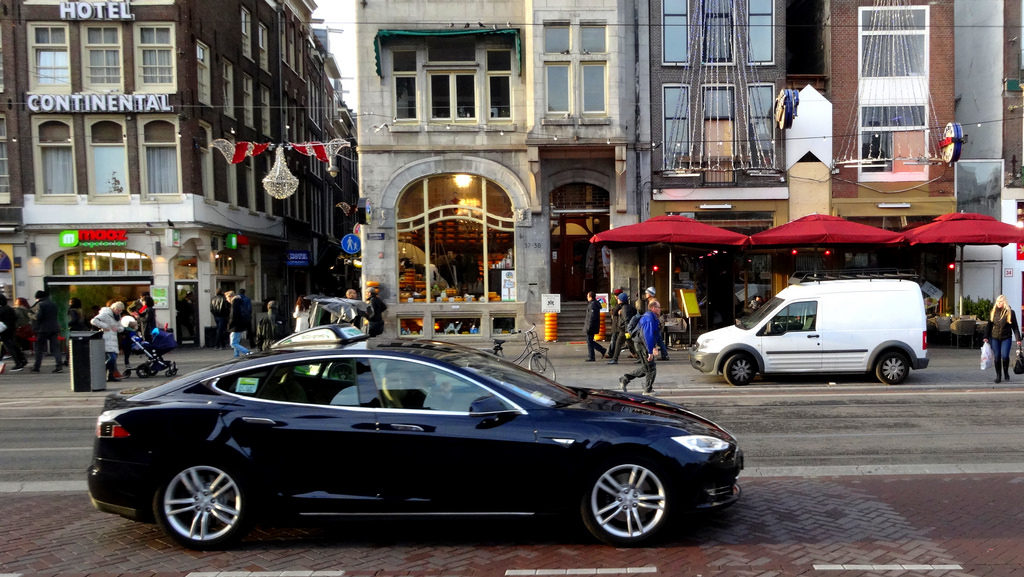
You don’t see many electric cars in Hillsdale, and thanks to Michigan politics, that won’t change anytime soon.
This September, Michigan officials confirmed the 2014 bill blocking Tesla, the electric car manufacturer, from opening company-owned dealerships in Michigan. This bill, which passed through the Michigan Senate and House in a single day, supposedly protects the car-buying public from predatory companies, upholds interests of the Detroit-based Big Three (General Motors, Ford, and Chrysler) and dealership owners. “We think the law today suffices,” said Terry Burns, executive vice president of the Michigan Automobile Dealers Association, referring to the recently confirmed law against company-owned dealerships. “It works for the manufacturers. It works for consumers.”
The decision about which products are available and who’s protecting consumers should not be up to the Big Three or the Michigan Automobile Dealers Association. Michigan should stop playing favorites and let Tesla compete.
While each branch of the Big Three offers a plug-in hybrid model — none of which are offering much competition to Tesla — shying away from Tesla’s competition makes the Big Three look suspiciously defensive. Embracing the competition from Tesla offers tons of opportunities to Michiganders. Not only does increased competition motivate suppliers to improve products and attract buyers, but expanding production of electric vehicles bolsters job and innovation opportunities. The relative novelty of electric cars is an opportunity for creativity and specialization, not suspicion.
Michigan’s law against Tesla doesn’t look like fatherly concern. It looks like the Big Three feel threatened and may be stuck in the technological mud.
Electric cars are relatively new compared to gasoline cars, and possibly less familiar. The most popular non-combustion car, the Toyota Prius, actually uses a hybrid of gas and battery technologies. Tesla’s cars are fully electric, the kind you literally plug and charge with a giant extension cord.
A car with a cord sounds alien, but Tesla’s CEO Elon Musk sets an optimistic tone. The point of founding Tesla, as he wrote this summer on the Tesla blog, “was, and remains, accelerating the advent of sustainable energy, so that we can imagine far into the future.” The company aims to sell 50,000 vehicles by the end of this year, ambitiously shooting for 500,000 vehicles sold in 2018.
Elon’s optimism is, for once, proving well-founded. Earlier this month, Tesla shares rose 4.6 percent, resulting from a dramatic increase in sales (70 percent) from last quarter. In addition, Tesla’s new electric sedan leads Chevrolet’s electric offering, the Volt, in sales by 5,000 vehicles — even though the Tesla costs twice as much. Interest in electric cars is picking up speed.
Why doesn’t Michigan capitalize on this interest?
Existing dealerships, whether franchised or not, are unfamiliar not only with Tesla’s product, but with electric cars in general. Allowing Tesla to manage its own dealerships encourages Detroit manufacturers as well as Tesla to do what each does best—unless Detroit becomes more aggressive in the electric car market.
Let’s assume minimal political machinations in the existing automotive world, and say that the Big Three are merely skeptical about the success of electric cars. In that case, they have nothing to lose if Tesla nosedives, and they would get to rejoice in their prediction if it does. On the other hand, if electric cars take off, Detroit’s existing electric models stand to benefit.
More importantly, the refusal of Tesla’s dealership request denies Michiganders a viable product. If government is truly so concerned that consumers will be ripped off while buying directly from
Tesla, their ban on Tesla is unreasonable; the self-interest of buyers will protect them more effectively than a bill.
Similarly, if Tesla’s direct business strategy backfires, that’s Tesla’s problem. Also, as of last year, Ford sold more than 2.6 million vehicles, making it America’s best selling brand for the sixth straight year. That’s 52 times as many as Tesla currently aims to sell this year. These numbers hardly compare.
Michigan’s flat refusal of Tesla’s dealership request plays to the interests of the Big Three and the dealership owners, completely overlooking the people’s choice. Allowing Tesla to compete in the electric car market, bringing an increasingly popular and polished product to consumers, is in the best interests of the people of Michigan. Tesla’s attempted move into established combustion territory signals the potential of electric cars—potential that already-existing manufactures need to seize. Michigan legislature is stifling innovation and consumer choice due to political fear. Just because it works for the manufacturers does not mean it works for the consumers.
Ms. Houghton is a sophomore studying English and mathematics.

